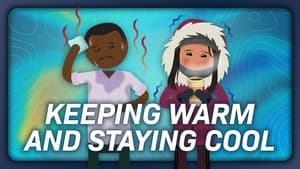All Available Episode
All Season 1 Episode

1. What is Climate Change?
We know that temperatures on Earth have fluctuated dramatically in the past, but we also know that by burning fossil fuels we are causing temperatures to rise faster than ever. In this episode of Crash Course Climate and Energy, we’ll introduce some core concepts that will help us throughout the series, like the difference between climate and weather, and take a look back through the Earth’s history at other periods of significant climate change.

2. Why Do We Release So Much Gas?
The carbon dioxide we’re pumping into the air every day is causing unprecedented global warming and climate change. In this episode of Crash Course Climate and Energy, we’ll give you a better understanding of the types of energy that cause carbon emissions, and discuss the disparities between the countries with the most emissions and those already facing the worst effects of climate change.

3. Can We Make Electricity Without Fossil Fuels?
Nearly a third of all our greenhouse gas emissions come from generating electricity. Scientists agree that we have to find ways to make electricity without releasing so much carbon dioxide into the air. In this episode of Crash Course Climate and Energy, we’re going to tell you about some of the ways scientists and engineers are decarbonizing the electricity supply with renewable sources such as solar, wind, nuclear, and hydroelectric and the benefits and drawbacks of each.

4. How Can We Store Renewable Energy?
Decarbonizing our power production is vitally important if we want to curtail climate change, but there are some major logistical issues we’re going to have to overcome before we can do that. In this episode of Crash Course Climate and Energy, we’ll take a look at the challenges we face when creating, distributing, and storing electricity from renewable sources.

5. Can We Keep Warm and Stay Cool Without Fossil Fuels?
Humans have come up with some clever ways of keeping cool when it's warm, and staying warm when it’s cool. But unfortunately, our heating and air conditioning systems are worsening the climate crisis. In this episode of Crash Course Climate and Energy, we’ll take a look at some of the ways we might be able to decarbonize those systems to reduce the amount of greenhouse gases they produce.

6. Can We Gas Up... Without Gas?
From the cars that take us downtown to the airplanes that fly us across the globe, transportation is one of the most visible and personal ways we are impacting the Earth’s climate. In this episode of Crash Course Climate and Energy, we’ll explore the benefits and challenges of electric vehicles, and look at some of the ways we’re trying to decarbonize much larger modes of transportation.

7. Can We Capture Greenhouse Gases?
It’s one thing to say a business is carbon neutral. It’s another to be able to truly account for that carbon at all stages of the production process. In this episode of Crash Course Climate and Energy, we’ll take a look at efforts to count all those greenhouse gas emissions, reduce them, and capture the ones we can’t avoid.

8. How Will Climate Change Continue to Affect Us?
Our warming planet isn’t just a threat to future generations; it’s a threat to us right now. If we don’t mitigate it, the continued rise in global temperature will have ripple effects throughout ecosystems and communities. In this episode of Crash Course Climate and Energy, we’ll look at how climate change has already affected our planet, and what the future might hold.

9. Are Natural Disasters Actually Natural?
Climate change has no bias, but our societies and systems do. And although it’s a danger to all of us, a changing climate affects some groups disproportionately, raising issues of justice and equity. In this episode of Crash Course Climate and Energy, we’ll take a look at the ways injustice within societal structures causes climate change to affect some more than others and discuss some of the work that environmental justice advocates are doing in response.

10. How Do Countries Work Together on Climate Change?
Climate change is being addressed by individuals, activist groups, and large corporations, but it’s going to take getting entire nations on board if we want to really meet our climate goals. In this episode of Crash Course Climate and Energy, we’ll learn about the alphabet soup that is global climate organization and take a look at some successful – and not-so-successful – international climate policies.

11. The Hidden Price of Climate Change
Ditching fossil fuels is the most important thing we can do to combat climate change, but it can feel like wandering through a labyrinth to try to do so. In this episode of Crash Course Climate and Energy, we'll explore why it's so hard for us to break up with fossil fuels and the ways governments and fuel companies affect our relationship with them.

12. How Can We Respond to Climate Change?
Now that we know how complex and interwoven climate change is with society globally, we can begin to see it everywhere. But that heightened awareness also means we can begin to see solutions everywhere. In this episode of Crash Course Climate & Energy, we break down what needs to happen in our governments, corporations, and communities to slow the increase of Earth's average temperature.
